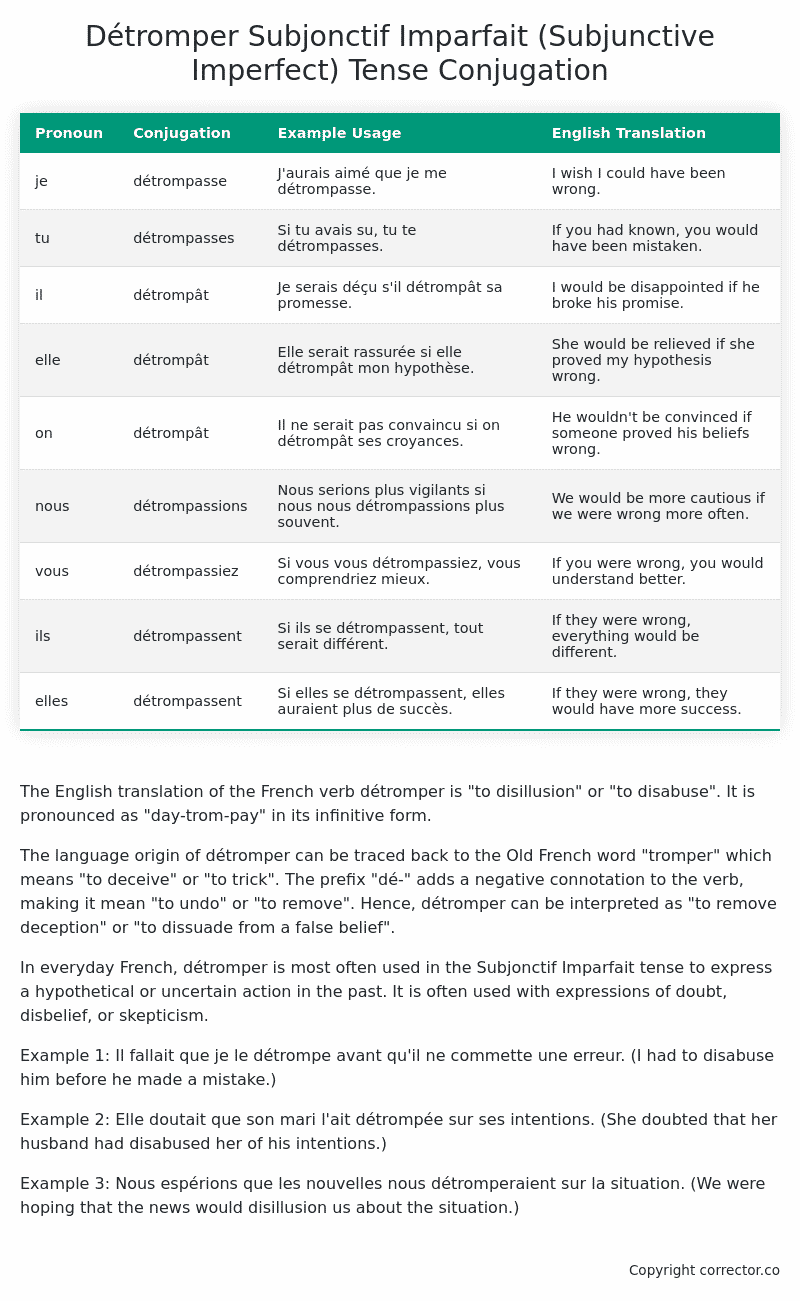Subjonctif Imparfait (Subjunctive Imperfect) Tense Conjugation of the French Verb détromper
Introduction to the verb détromper
The English translation of the French verb détromper is “to disillusion” or “to disabuse”. It is pronounced as “day-trom-pay” in its infinitive form.
The language origin of détromper can be traced back to the Old French word “tromper” which means “to deceive” or “to trick”. The prefix “dé-” adds a negative connotation to the verb, making it mean “to undo” or “to remove”. Hence, détromper can be interpreted as “to remove deception” or “to dissuade from a false belief”.
In everyday French, détromper is most often used in the Subjonctif Imparfait tense to express a hypothetical or uncertain action in the past. It is often used with expressions of doubt, disbelief, or skepticism.
Example 1:
Il fallait que je le détrompe avant qu’il ne commette une erreur.
(I had to disabuse him before he made a mistake.)
Example 2:
Elle doutait que son mari l’ait détrompée sur ses intentions.
(She doubted that her husband had disabused her of his intentions.)
Example 3:
Nous espérions que les nouvelles nous détromperaient sur la situation.
(We were hoping that the news would disillusion us about the situation.)
Table of the Subjonctif Imparfait (Subjunctive Imperfect) Tense Conjugation of détromper
| Pronoun | Conjugation | Example Usage | English Translation |
|---|---|---|---|
| je | détrompasse | J’aurais aimé que je me détrompasse. | I wish I could have been wrong. |
| tu | détrompasses | Si tu avais su, tu te détrompasses. | If you had known, you would have been mistaken. |
| il | détrompât | Je serais déçu s’il détrompât sa promesse. | I would be disappointed if he broke his promise. |
| elle | détrompât | Elle serait rassurée si elle détrompât mon hypothèse. | She would be relieved if she proved my hypothesis wrong. |
| on | détrompât | Il ne serait pas convaincu si on détrompât ses croyances. | He wouldn’t be convinced if someone proved his beliefs wrong. |
| nous | détrompassions | Nous serions plus vigilants si nous nous détrompassions plus souvent. | We would be more cautious if we were wrong more often. |
| vous | détrompassiez | Si vous vous détrompassiez, vous comprendriez mieux. | If you were wrong, you would understand better. |
| ils | détrompassent | Si ils se détrompassent, tout serait différent. | If they were wrong, everything would be different. |
| elles | détrompassent | Si elles se détrompassent, elles auraient plus de succès. | If they were wrong, they would have more success. |
Other Conjugations for Détromper.
Le Present (Present Tense) Conjugation of the French Verb détromper
Imparfait (Imperfect) Tense Conjugation of the French Verb détromper
Passé Simple (Simple Past) Tense Conjugation of the French Verb détromper
Passé Composé (Present Perfect) Tense Conjugation of the French Verb détromper
Futur Simple (Simple Future) Tense Conjugation of the French Verb détromper
Futur Proche (Near Future) Tense Conjugation of the French Verb détromper
Plus-que-parfait (Pluperfect) Tense Conjugation of the French Verb détromper
Passé Antérieur (Past Anterior) Tense Conjugation of the French Verb détromper
Futur Antérieur (Future Anterior) Tense Conjugation of the French Verb détromper
Subjonctif Présent (Subjunctive Present) Tense Conjugation of the French Verb détromper
Subjonctif Passé (Subjunctive Past) Tense Conjugation of the French Verb détromper
Subjonctif Imparfait (Subjunctive Imperfect) Tense Conjugation of the French Verb détromper (this article)
Subjonctif Plus-que-parfait (Subjunctive Pluperfect) Tense Conjugation of the French Verb détromper
Conditionnel Présent (Conditional Present) Tense Conjugation of the French Verb détromper
Conditionnel Passé (Conditional Past) Tense Conjugation of the French Verb détromper
L’impératif Présent (Imperative Present) Tense Conjugation of the French Verb détromper
L’infinitif Présent (Infinitive Present) Tense Conjugation of the French Verb détromper
Struggling with French verbs or the language in general? Why not use our free French Grammar Checker – no registration required!
Get a FREE Download Study Sheet of this Conjugation 🔥
Simply right click the image below, click “save image” and get your free reference for the détromper Subjonctif Imparfait tense conjugation!

Détromper – About the French Subjonctif Imparfait (Subjunctive Imperfect) Tense
Formation
Common Everyday Usage Patterns
Interactions with Other Tenses
Subjonctif Présent
Indicatif Passé Composé
Conditional
Conditional Perfect
Summary
I hope you enjoyed this article on the verb détromper. Still in a learning mood? Check out another TOTALLY random French verb conjugation!


